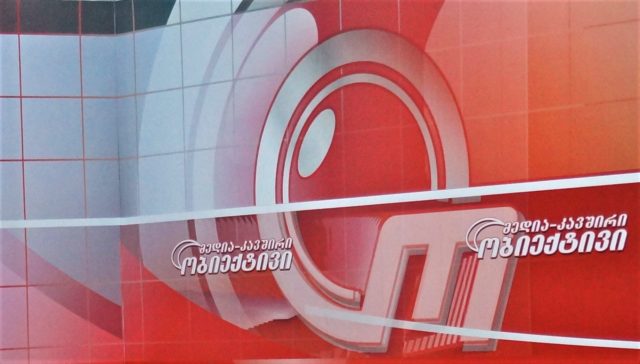
Anti-Western Propaganda in Georgia Grows in Strength and Sophistication
Publication: Eurasia Daily Monitor Volume: 14 Issue: 57
By:

Georgia’s Media Development Foundation (MDF) recently released a 53-page report on anti-Western propaganda in the country. The April 18 report covers the period from January 1, 2016, to December 31, 2016. It relies on a year-long study of anti-Western messages and information (or often disinformation) spread by a number of Georgian TV, print, and Internet sources as well as various politicians, non-governmental organizations (NGO), and some renowned members of Georgian society (Mdfgeorgia.ge, April 18). This is the MDF’s second such report, the first one released in 2015, which covered the time period from February 2014 to February 2015 (Mdfgeorgia.ge, February 2015).
The MDF’s latest report reveals a growing strength and sophistication of anti-Western propaganda in Georgia. It concludes that a collection of old media sources and non-governmental organizations that existed before 2012 (that is, before the ruling Georgian Dream coalition’s ascent to power) in addition to multiple outlets founded after 2012 have been gradually altering public opinion in the country. The MDF report conditionally divides them into two groups: those outright pro-Russian and those that are anti-liberal and ethno-nationalistic but do not necessarily support Moscow. Nonetheless, both groups are united by the fact that they are distinctly anti-Western (Mdfgeorgia.ge, April 18).
Some of these identified media outlets and NGOs include, but are not limited to, the TV channel Obieqtivi; newspapers Asaval-Dasavali, Alia and Kviris Qronika; Internet news sites geworld.ge and saqinform.ge; as well as Russian-linked NGOs the Eurasian Institute and the Global Research Center. Other media outlets, such as Kavkasia TV, Maestro TV, the paper Kviris Palitra and the website marshalpress.ge, are also often used by various domestic anti-Western political parties, politicians and some clergy as a platform for the dissemination of their opinions and sometimes outright disinformation. Moreover, a growth in the number of once marginal, but now vocal Georgian anti-Western political parties and groups is also noteworthy (see EDM, February 14, 2015); they now number around a dozen across the country (Civil Georgia, April 17).
However, the increase in numbers is not the only trend. Anti-Western propaganda in Georgia has demonstrated increasing sophistication as to its ability to capitalize on the public mood and to skillfully frame issues and narratives in ways that manipulate existing public opinion. For instance, various anti-Western media sources and politicians have quickly seized on Georgian society’s frustration with the country’s yet unfulfilled expectations of joining the North Atlantic Treaty Organization (NATO). Hence, anti-Western media outlets and political groups constantly frame the question of Georgia’s NATO integration as “utopian,” as the Alliance has been reluctant to grant Georgia membership at this point (Sputnik-georgia.com, May 10, 2016; Marshalpress.ge, April 25, 2016).
Such a discourse is frequently “backed up” by outright disinformation and groundless assumptions. For instance, anti-Western media sources and politicians often emphasize that Georgia’s NATO membership would lead to a final loss of the Russian-occupied separatist territories of Abkhazia and Tskhinvali region (South Ossetia). Nonetheless, these outlets never provide a valid explanation or hypothesis for how the first could lead to the second, nor more generally, whether there really exists any causality between the two (Civil Georgia, April 17). Moreover, these anti-Western media outlets regularly portray NATO as an aggressor organization and the United States as an unreliable political and military partner. Illustratively, the US was accused of only sending Georgia “water and diapers” (referring to summer 2008 humanitarian aid) during the 2008 Russian-Georgian war, when instead the country most needed real military help with troops and weapons (Mdfgeorgia.ge, February 2015).
Clearly, such anti-Western propaganda is already having a significant impact on Georgian public opinion, as exemplified, first and foremost, by the rapidly declining Georgian backing for NATO membership. According to a recent survey by the National Democratic Institute (NDI), from 2013 to 2016, support dropped by a staggering 20 percent: from 81 percent to 61 percent (Ndi.org, November 2016).
However, anti-Western propaganda in Georgia is not limited to NATO. In addition, it skillfully plays to the cultural sensitivities of a deeply conservative, religious Georgian society. Specifically, the Western world (including the United States and European Union) is portrayed as a force that “imposes homosexuality […] and fights against national identity, traditions, Orthodox Christianity, [and] family as a social institution.” Georgian NGOs are demonized as complicit Western puppets that sell out their country’s interests. Against this background, Russia is perceived as a fellow Orthodox country and a counterweight to the West. Whereas, Georgian military deployments to international missions in Iraq, Afghanistan and Central Africa are framed not as contributions to collective global security, but as unnecessary sacrifices made for others (Mdfgeorgia.ge, April 18). In this avalanche of carefully mixed lies, truth, disinformation and false accusations, it can become nearly impossible for an average citizen to dissect what is really taking place.
And now, these narratives are gaining ground in Georgian society, as shifting polling data as well as the increasing number of anti-Western media sources and groups suggest. One of the reasons for the success of anti-Western propaganda in Georgia is likely connected to the detachment of pro-Western Georgian political and intellectual elites (as well as of Georgian NGOs) from regular Georgian people and their problems. Also to blame are arguably the elites’ inability to introduce and relate Western values to Georgian society in any meaningful way, as well as a general public disappointment with the West’s failure to provide Georgia a clear path toward NATO and EU membership.
Yet, Georgian political elites do not appear to fully realize the extent of anti-Western propaganda or the true impact it is having on Georgia. Aside from occasional statements of concern (Info9.ge, July 19, 2016), Georgian pro-Western politicians have not done much, if anything at all, to counter this growing narrative in Georgia’s information space. Georgian public opinion is rapidly changing, and it is certainly time to address the growing problem before it become irreversible.



